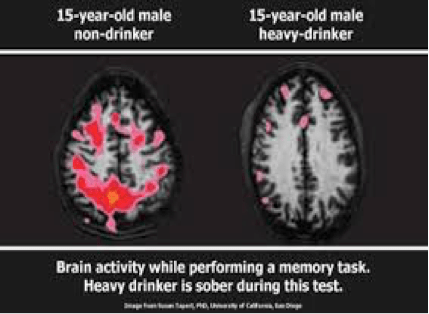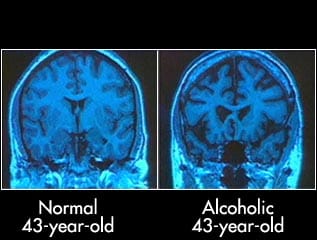In order to ensure we take care of our brains in the holistic sense and ensure it is given the opportunity to work properly, we have to consider what we put into our body. Alcohol is a drug and if consumed heavily can severely affect the functioning of your brain in a very negative way.
If you look at the brain activity scan you can see the brain activity of a young teenage boy who does not drink alcohol. Compare that to the 15 year old heavy drinker and hopefully you will begin to understand why heavy alcohol consumption and normal brain function don’t mix. What’s worse is these images are from 15 year olds, whose brains are only developing. With binge drinking so common amongst our Irish teenagers, how can we hope to develop a nation of people with normal brain function, if this continues? The problem is how can we get young people to understand that heavy alcohol consumption could have an effect on their brain function?
The long term effect of alcohol consumption on the structure and consequently function of the brain can be seen in the picture of the 43 year old normal male versus that of an alcoholic. Look at the picture and say which brain you would like to have? Which brain do you think functions in a normal manner with normal reactions and levels of reason? Heavy alcohol use can affect the functioning of a person’s brain and put them at increased risk of mental health issues.

If you look at the Alcohol Action Ireland website you will see “Alcohol can contribute to the development of mental health problems as well as exacerbating pre-existing mental health difficulties. Alcohol can affect our ability to cope, manage and overcome everyday stresses and significant life events such as unemployment or bereavement.” So if you want to have the best mental health possible, heavy alcohol consumption must be dramatically reduced.
One of the most disturbing aspects of alcohol consumption is binge drinking. The World Health Organization (WHO) has defined binge drinking as drinking 6 or more standard drinks (3 pints of beer) on one occasion. The level of alcohol consumption defined as binge drinking for females is generally lower, due to female’s inability to process alcohol to the same capacity as males. This is mainly due to physiological differences such as differences in body composition between genders and females reduced ability to produce the enzyme alcohol dehydrogenase to break down alcohol.
While total alcohol consumption in Ireland has decreased in recent times, Ireland still has one of the highest binge drinking rates, and was recently found in 2014 to have the second highest binge drinking rate in the world, not something to be proud of. What I don’t understand is why when the facts are there about alcohol and its possible effects on health, consumption is still so high?
Heavy alcohol consumption especially in the form of binge drinking, does not appear to be decreasing, and as long as it does not it is very difficult to help mental health problems decrease, but we have to keep trying to get the message out there – alcohol consumption has major effects on mental health!
Image source: Image of 15 year old non-drinker and heavy drinker courtesy of Susan Tapert, University of California. Image of alcoholic brain is from: smart-kit.com
Support Our Campaign
We rely on the generosity of the public to fund our work and so far together we have achieved great things! Please do continue to support us so we can provide future generations in Ireland with the resources to recognise and talk about their emotions, and equip them to navigate the ever-changing world around them as they grow





























